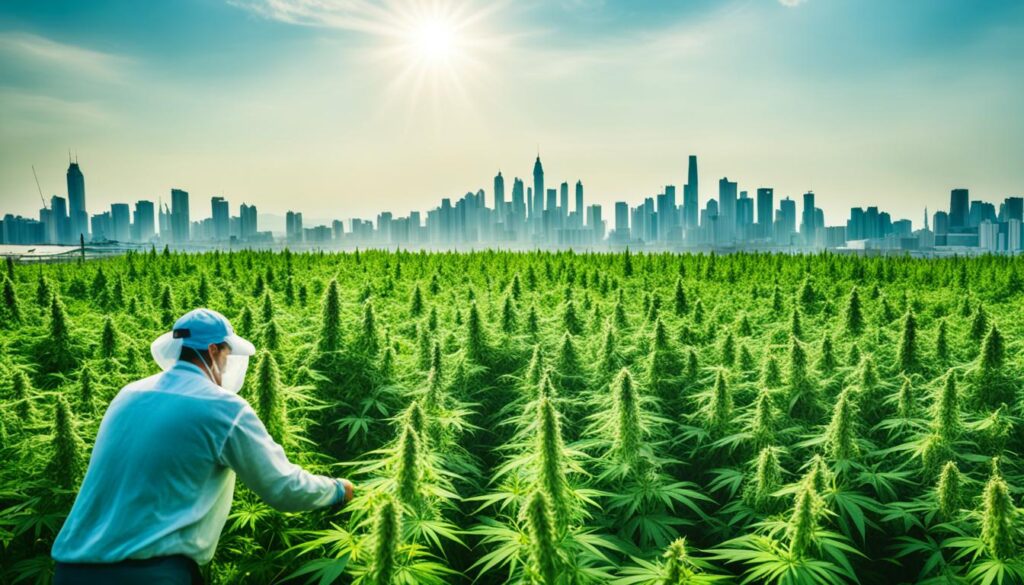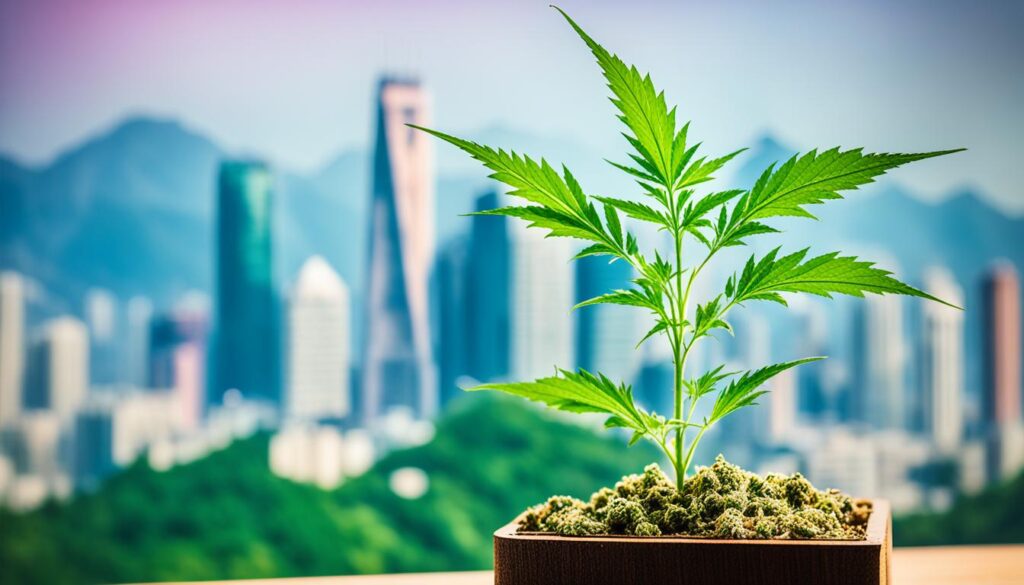Shenzhen, China, is a tech hub where weed is illegal. The country has a hemp industry but not weed. If you’re caught with weed, you could face big trouble.
Authorities in Shenzhen take drug laws seriously. They test people in places foreigners go. If you test positive for weed, you could be arrested, fined, deported, and banned from coming back.
It’s important to know the laws in Shenzhen. Using or selling weed can get you in big trouble. You could go to jail, pay a huge fine, or even face death.
Be careful with weed in Shenzhen. It’s better to be safe than sorry. This way, you can have a good time without getting into trouble.
Key Takeaways
- Cannabis is illegal in Shenzhen and China, with strict penalties for possession, use, and sale.
- Authorities in Shenzhen conduct random drug tests, and testing positive can lead to detention, fines, deportation, and bans from re-entering the country.
- Penalties for drug offenses in Shenzhen can include long jail sentences, heavy fines, and even the death penalty.
- It is crucial to exercise caution and discretion to avoid legal issues related to drug offenses in Shenzhen.
- Compliance with local drug laws is essential for a safe and enjoyable experience in Shenzhen.
Legal Status of weed in Shenzhen, China
In China, cannabis is strictly illegal. Weed is seen as a Schedule I, like heroin and cocaine. If you’re caught with it, you could face big penalties.
Possession
Having cannabis in China can get you into big trouble. If you have over 5 kilograms, you could even be put to death. Smaller amounts can get you locked up for two weeks to life, with big fines too. Shenzhen, a big city in China, takes these laws very seriously.
Sale
Selling or giving out cannabis is also a big no-no in China. You could get a long prison sentence or even death for it. Even in some cities that might be a bit more lenient, the risks are still very high in Shenzhen.
Growing
Growing cannabis is illegal too, and you could go to prison for it. Even in remote places, the law is strict. While some grow it, especially in the north and south, the government is cracking down. Trying to grow it in Shenzhen or anywhere in China is risky.
Weed in Shenzhen, China: Strict Enforcement
In Shenzhen, China, the police are very tough on weed. They have strict drug laws and do random drug tests, especially in places foreigners go.
If you test positive, you could face big trouble. You might get immediately detained, fined a lot, deported, or banned from coming back. So, it’s best to stay away from weed in Shenzhen to avoid getting in trouble.
Shenzhen is very serious about weed and drugs. They have a zero-tolerance policy and can be very harsh. This means police often raid places and do random drug tests when you come into the country.
If you get caught in Shenzhen, things can get very bad. Remember, cannabis enforcement in Shenzhen is very strict. Always be careful if you’re in the city.
“China has a zero tolerance policy towards drugs, and severe penalties, including the death penalty, are imposed for drug-related offenses.”
Industrial Hemp in China
China is a big leader in making industrial hemp, even though it doesn’t allow recreational cannabis. It makes over 50% of the world’s hemp. Most of this hemp comes from the Yunnan and Shandong provinces.
China’s Leading Role in Hemp Production
China’s hemp industry is booming because of the world’s growing need for hemp products like CBD. In 2019, China grew hemp on 66,700 hectares. Most of this was fiber hemp in Heilongjiang province.
Yunnan also grew hemp for special compounds on 11,500 hectares.
Economic Potential of Hemp Expansion
China’s hemp industry could bring big economic benefits, especially to rural areas. It could give people better jobs and higher pay. The government plans to grow more hemp in places like Gansu, Heilongjiang, Anhui, Inner Mongolia, and Xinjiang.
This will make China even more important in hemp production and exports.
| Province | Hemp Cultivation Area (Hectares) |
|---|---|
| Heilongjiang | 33,350 |
| Yunnan | 11,500 |
| Shandong | 6,200 |
| Anhui | 4,100 |
| Gansu | 3,800 |
| Jilin | 3,500 |
China is leading the world in hemp production. It’s ready to meet the growing demand for hemp products. This will make China even more important in the hemp industry in China.

“China’s industrial hemp industry has the potential to revolutionize the agricultural landscape, providing economic opportunities and sustainability for rural communities.”
Historical and Cultural Context
Cannabis and hemp have been used in China for thousands of years. They are deeply tied to the country’s ancient culture and traditions. Archaeologists found hemp cloth in old burial chambers from the Chou Dynasty (1122-249 B.C). Written records from that time talk about hemp being used for clothes and paper.
Hemp and cannabis were important in ancient Chinese culture. They were used in medicine and even in war. But today, the Chinese government doesn’t allow people to use cannabis for fun. This has made it a taboo subject in modern China.
Early Use of Hemp in Ancient China
People in China have grown cannabis and hemp for thousands of years. Recent studies suggest it might have started in Southwest China. Archaeologists found over 800 cannabis seeds in Yunnan, Southwest China, from 1650 to 400 BC.
These seeds show that cannabis was becoming more specialized for different uses. It was one of the “five grains” in ancient China, along with millet, rice, barley, and soybean. This shows how important it was in farming and culture.

“Cannabis sativa (sensu lato) was likely selected early for multiple uses as a fiber, oilseed, and for medicinal/ritual drug purposes.”
Even with its long history, the Chinese government now strictly controls cannabis. This has made it a big problem in today’s society. Liu Yuejin, the deputy director of narcotics control, said marijuana use went up by over 25 percent in 2018. This shows the challenge of balancing China’s old cannabis traditions with today’s world.
Medicinal weed in Shenzhen, China: Prospects and Challenges
China is a big producer of medicinal marijuana, even though it doesn’t allow recreational use. It has over 50% of the world’s cannabis patents. But, Chinese people can’t use medical cannabis yet because the government doesn’t support it.
China could be a big player in the global medicinal cannabis market. But, it hasn’t changed its views on cannabis for health reasons. This is because of its focus on traditional Chinese medicine.
Research on cannabis is growing worldwide, including in China. This has made people more interested in medicinal marijuana. China’s view on this could change the world of medical cannabis.
“The global medical cannabis industry is expected to reach $55.8 billion by 2028, and China’s dominant position in the cannabis patent landscape suggests its potential to lead this emerging market. However, the government’s strict enforcement of anti-drug policies poses a significant challenge to the legalization of medical marijuana in the country.”
| Key Challenges | Potential Opportunities |
|---|---|
|
|
China’s view on medical cannabis will affect the future of this industry. The challenges are big, but China’s unique position could bring big opportunities. This makes the future of medicinal cannabis in China look promising.
CBD Products: Legal Ambiguity
The rules on CBD products in China are unclear. China leads the world in hemp industry. But, using and selling CBD-infused goods is banned for people in China.
All hemp-derived products, like CBD, are made for export only. Chinese people can’t buy them. This shows how tricky China’s rules on cannabis-related industries are.
The Hong Kong, China government wants to stop selling CBD products. They might put CBD in the same group as dangerous drugs. Tests found some CBD products had up to 42.5% THC. This makes people worry about CBD becoming a psychoactive substance.
The European Food Safety Authority (EFSA) stopped checking if CBD is safe as a food. They have safety concerns and don’t have enough data. This shows the big challenges in the CBD industry in China and other places.
| Key Insights | Data |
|---|---|
| The global cannabis concentrate market was valued at $1.7 billion USD in 2022. | – |
| Rosin’s share of dabbable dollar sales grew significantly in mature markets (CA, CO, OR, MI, IL), from 8% in January 2021 to 16% in October 2022. | BDSA Retail Sales Tracking |
| Hydrocarbon extraction can be a winning strategy for dealing with lower-quality biomass inputs. | – |
| The ITC determined that CCELL failed to establish a “domestic industry,” which is required for ITC claims designed to protect US interests in fair trade. | – |
| CCELL alleged that 37 vape hardware companies infringed upon its patents; the ITC ruled in favor of the respondents in that case. | – |
Even with legal uncertainties, the CBD industry in China is growing. Companies are looking at CBG and CBN from industrial hemp. They’re trying to work around the rules. As the rules on CBD change, the industry must be careful to make hemp-derived CBD products safe and responsible.
Conclusion
In Shenzhen, China, using cannabis is a big no-no. If you get caught with, selling, or growing it, you’ll face big trouble. The police are very strict about drug laws here.
China is a big name in making industrial hemp. But, using cannabis for health or fun is not allowed. The rules on CBD products are not clear.
If you live in or visit Shenzhen, you must know the laws. Don’t mess with cannabis to avoid big problems. The rules on cannabis in Shenzhen are very strict. But, the hemp industry is doing well here.
The future of cannabis in China is hard to predict. It’s important to be careful and informed. This way, you can have a good time in Shenzhen while following the law.

As a veteran weed smoker for over 30 years and been very clean for the last 3 years, I have been craving it.
One thing I’ve never done is consume it?
I came across SunJet Plug and thought mmmm how esp with legalities etc.
So I made the plunge and purchased 12 brownies, well within 30 mins it kicked in and it was immense as I had a whole one from the off 😜
The rest did not last a week I was having 2 a day and my wife lost me for a few days I was in my own world apparently.
Kudos to the Sunjet plug love em, the taste is a bit undesirable could do with a tweak or two other than that no complaints
Contact him on his telegram link: t.me/sunjetplug
His email : sunjetplug@gmail.com
Many many thanks.😁
Take note ,he does not have telegram channels
Sunjet plug is 100% legit.. I’m a repeat customer.. I’ve ordered 10+ times now, and I’ve never had an issue.. Great product, great service.
Amazing. I’ve bought a few different flavoured vapes now and they are all fabulous. Would highly recommend.
Reach him on telegram link.
Sunjet plug is extremely trust worthy , they never fail in what ever product I order, and its always in my hands with an hour of ordering 99% of the time….. its honestly rare when its more than 2 hours and that’s only because its the weekend when ive orded or a national holiday is on or something lol …. brilliant service I’m probably pushing maybe 2 months with them and I’ve never been disappointed ❤️ my only recommendation would maybe do a stamp card to get something free after 5 orders or a loyalty bonus of some kind ❤️
Email sunjet.. sunjetplug@gmail.com